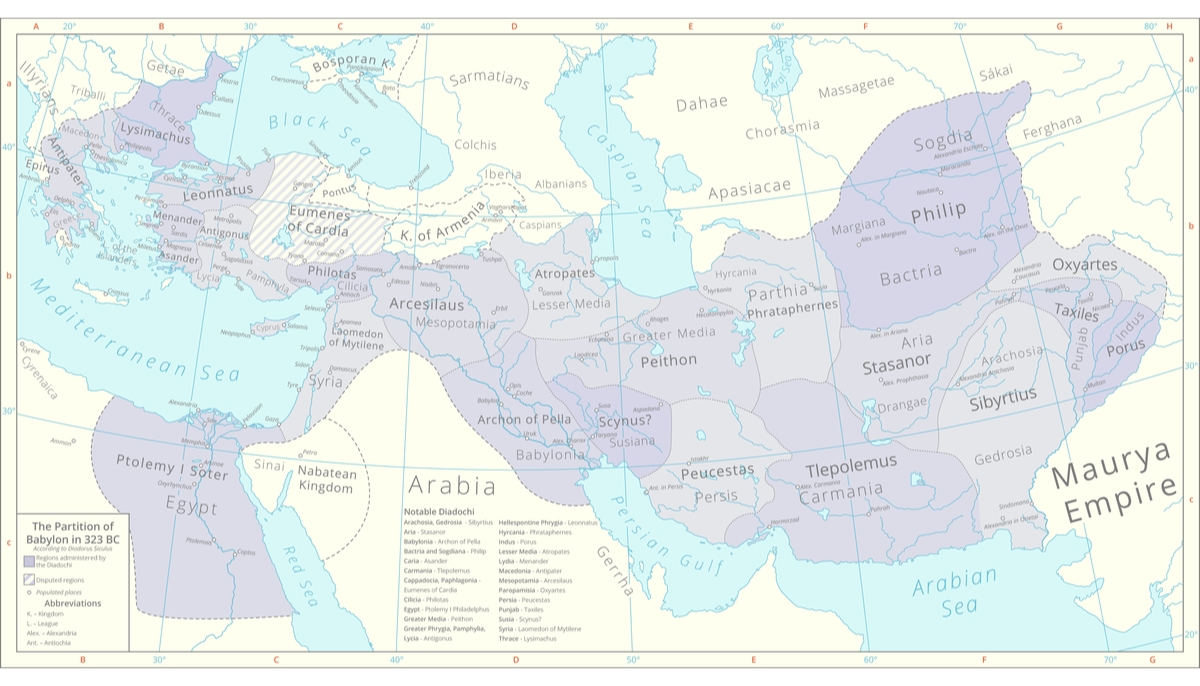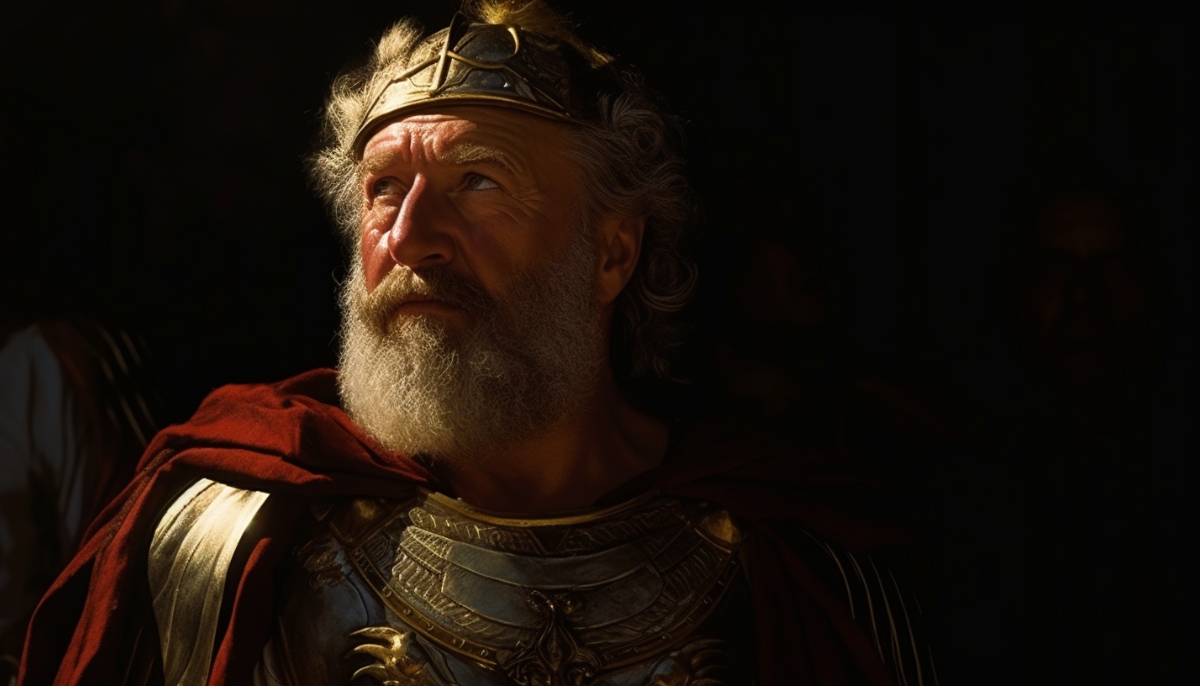Antipater played a pivotal role in the conquests of Alexander the Great and the subsequent Diadochi Wars. He served as regent of the Macedonian Empire while the king was away on his conquests.
He would later become one of the key players in the power struggles that followed Alexander’s death.
Antipater’s legacy is one of both achievement and controversy, from his military successes to his political maneuvering.
His story offers valuable insights into the ancient world’s complex dynamics of power and leadership.
The early life of Antipater and his role in Alexander the Great’s military
Antipater was born in 397 BC in the Macedonian region of Upper Macedonia. He was the son of Iollas and the father of Cassander, who would later become king of Macedon.
As a young man, Antipater joined the army of Philip II, the father of Alexander the Great, and distinguished himself in several battles. He continued to serve under Alexander and became one of his most trusted generals.
Antipater helped crown Alexander the Great
Antipater was instrumental in securing the succession of Alexander to the throne after his father’s death, King Philip II.
In the aftermath of Philip’s assassination in 336 BC, there was a risk of instability and chaos within the Macedonian court as various factions vied for power and influence.
However, Antipater and other older court members recognized the importance of a smooth transition of power, and they quickly threw their support behind the young Alexander. In particular, Antipater and Parmenion, another influential general in Alexander’s army, played a key role in demonstrating their support for the new king.
Antipater’s experience and influence within the court were crucial in navigating the complicated political landscape following Philip’s death. He had already proven himself as a skilled administrator during his time as governor of Macedonia and had developed strong relationships with other key figures in the Macedonian aristocracy.
The supreme commander of the European forces
As a reward for his loyalty and service, Alexander named Antipater the supreme commander of the European forces in his army. This position was important, placing Antipater in charge of a significant portion of Alexander’s army during his campaigns in Greece and beyond.
Strengthening Alexander’s rule
One of Antipater’s earliest actions as supreme commander was to join Alexander in putting down the rebellious Greek city of Thebes in 335 BC. After the city was defeated, Alexander left Antipater in sole command of the garrison there, clearly indicating his trust and confidence in his general.
In 331 BC, Antipater faced his most significant challenge yet when the Spartan king Agis III led an anti-Macedonian coalition with a massive army. Antipater quickly mobilized his forces, assembling a massive army to face the rebellious king.
The two sides clashed at the Battle of Megalopolis, where Antipater used the might of the Macedonian army to crush the Spartan king.
This victory was a significant achievement for Antipater, demonstrating his skill as a military commander and solidifying his reputation as one of the most capable leaders in Alexander’s army.
It also played a crucial role in securing Macedonian control over Greece and preventing further rebellions against Alexander’s rule.
Problems with Olympias
Despite Antipater’s impressive record of loyalty and service, he found himself in conflict with Alexander’s mother, Olympias.
The root of the conflict was Antipater’s decision to take in Cleopatra, Alexander’s sister, after she fell out with Olympias. This move angered Olympias, who saw it as a direct challenge to her authority and influence within the Macedonian court.
Growing division
Olympias repeatedly complained to Alexander about Antipater’s actions, and initially, the king seemed to ignore these complaints. However, over time, he began believing the accusations against his trusted general.
This was a significant blow to Antipater, who had worked tirelessly to support Alexander’s reign and maintain stability within the Macedonian court.
In the end, Alexander’s growing suspicions led him to take action against Antipater. He sent Craterus, another trusted general, to replace Antipater as the supreme commander of the European forces.
Antipater was ordered to meet Alexander in Babylon, where the king intended to confront him directly about his alleged wrongdoing.
This turn of events was a major setback for Antipater, who had devoted his entire career to serving the Macedonian monarchy.
He had built a reputation as one of the most capable and loyal commanders in Alexander’s army, and his ousting clearly indicated the growing instability and infighting within the Macedonian court.
Friction with Alexander the Great
Antipater found himself in a difficult position when the king requested that he send troops to join him in his planned invasion of Persia.
Alexander had grand ambitions to conquer the Persian Empire, and he needed all the support he could get from his trusted generals.
However, Antipater refused the request, arguing that Greece was not yet settled enough after the war to send troops overseas.
Instead, he sent his son Cassander to join the campaign, hoping to placate Alexander while maintaining the stability of his own territory.
Alexander saw this move as a personal affront, and it caused a rift between the two men that would never fully heal. Antipater’s family fell out of favor with the king, and rumors began circulating that Cassander may have played a role in Alexander’s eventual death.
These rumors were never substantiated, but they were a clear indication of the growing mistrust and suspicion that characterized the politics of the Diadochi Wars that followed Alexander’s death.
Life after the death of Alexander

Following the death of Alexander the Great, his vast empire began to fracture as his former generals and allies jostled for power and influence.
This period of conflict and instability, known as the Diadochi Wars, saw the rise of several powerful kingdoms and dynasties, each vying for control of the lands once ruled by Alexander.
The Lamian war
Antipater’s decision to withhold troops from Alexander’s Persian campaign proved to be prescient, as his concerns about the unsettled nature of Greece were soon proven correct.
Following Alexander’s death, the various factions within his empire began to jockey for power, and tensions quickly boiled over into open conflict.
Athenian uprising
The Lamian War was a major uprising against Macedonian rule led by the Athenians. They hoped to capitalize on the instability of the post-Alexander world and restore their ancient democracy to power.
Antipater and Craterus quickly mobilized their forces and marched to meet the Greeks in battle. Despite being outnumbered, they were able to win a decisive victory at the Battle of Crannon, effectively crushing the rebellion and reestablishing Macedonian control over Greece.
The aftermath of the Lamian War was marked by the imposition of direct Macedonian control over the Athenians, effectively ending their democracy and further consolidating the power of the Macedonian monarchy.
It was a turning point in the history of Greece, and it set the stage for the Hellenistic period that would follow.
Rift with Perdiccas
Antipater’s uneasy relationship with Perdiccas, one of Alexander’s top generals and a key player in the early years of the Diadochi Wars, came to a head over the marriage issue.
Perdiccas was widely believed to be plotting to entrench his own power and establish himself as the sole successor to Alexander’s empire. One of the ways he sought to achieve this was by breaking his betrothal with Antipater’s daughter and marrying Cleopatra, Alexander’s sister.
However, the insult of Perdiccas seeking to bypass his own arranged marriage and marry into Alexander’s family was not lost on the veteran Macedonian commander.
Antipater was deeply offended by what he saw as Perdiccas‘ power grab, and he began to oppose the ambitious general openly.
Antipater and the first war of the Diadochi (321–319 BC)
Antipater’s opposition to Perdiccas‘ bid for power ultimately led to the formation of an anti-Perdiccas coalition, which included Antipater’s long-time ally, Craterus, and Ptolemy, another of Alexander’s most trusted generals.
Perdiccas attempted to invade Egypt in a bid to cement his control over the empire. Still, he was ultimately defeated and killed by his own generals, who had grown tired of his constant power plays and overbearing personality.
The settlement of Triparadisus
The settlement of Triparadisus, which was brokered in 321 BC, marked a major turning point in the conflict.
Under the settlement terms, the empire was formally divided among Alexander’s surviving generals, with Antipater playing a key role in organizing the new political order.
He was appointed as regent of Macedon, responsible for overseeing the empire’s European territories, while Ptolemy was given control of Egypt and the surrounding regions.
Although the settlement of Triparadisus did little to quell the ongoing conflicts between Alexander’s former generals, it did provide a framework for the ongoing power struggle.
Death and Legacy of Antipater
Antipater died of old age at the ripe age of 80. After his death, Polyperchon, another member of the Macedonian aristocracy, succeeded him as regent.
However, his rule was marked by instability and conflict. Soon, the son of Antipater, Cassander, challenged Polyperchon for power and control of the Macedonian Empire.
Cassander eventually consolidated power and became the new ruler of Macedonia. Under his rule, he continued to expand Macedonian control and influence throughout the region, solidifying the legacy of Antipater and his fellow generals who had helped Alexander conquer the known world.
Antipater’s role in shaping the early years of the Hellenistic era cannot be understated, and his legacy lived on through the reigns of his successors.






